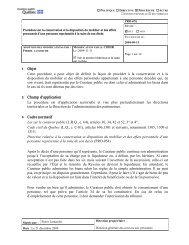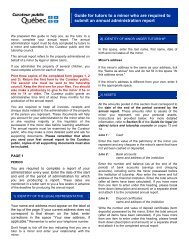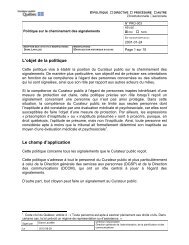My mandate in case of incapacity - Le Curateur public du Québec ...
My mandate in case of incapacity - Le Curateur public du Québec ...
My mandate in case of incapacity - Le Curateur public du Québec ...
Create successful ePaper yourself
Turn your PDF publications into a flip-book with our unique Google optimized e-Paper software.
la<br />
à justice<br />
votre<br />
portée<br />
<strong>My</strong><br />
Mandate<br />
<strong>in</strong> Case<br />
<strong>of</strong> Incapacity<br />
LES PUBLICATIONS DU QUÉBEC
<strong>My</strong><br />
Mandate<br />
<strong>in</strong> Case<br />
<strong>of</strong> Incapacity<br />
LES PUBLICATIONS DU QUÉBEC<br />
1000, route de l’Église, bureau 500, <strong>Québec</strong> (<strong>Québec</strong>) G1V 3V9<br />
SALES AND DISTRIBUTION<br />
Telephone: 418 643 - 5150, Toll free: 1 800 463 - 2100<br />
Fax: 418 643 - 6177, Toll free: 1 800 561 - 3479<br />
Website: www.<strong>public</strong>ations<strong>du</strong>quebec.gouv.qc.ca
Bibliothèque et Archives nationales <strong>du</strong> <strong>Québec</strong><br />
and Library and Archives Canada<br />
catalogu<strong>in</strong>g <strong>in</strong> <strong>public</strong>ation<br />
Ma<strong>in</strong> entry under title:<br />
<strong>My</strong> Mandate <strong>in</strong> Case <strong>of</strong> Incapacity<br />
9th ed.<br />
(La justice à votre portée)<br />
Issued also <strong>in</strong> French under title: Mon mandat en cas<br />
d’<strong>in</strong>aptitude.<br />
ISBN 978-2-551-19846-7<br />
1. Mandate <strong>in</strong> <strong>case</strong> <strong>of</strong> <strong>in</strong>capacity — <strong>Québec</strong> (Prov<strong>in</strong>ce).<br />
2. Capacity and disability — <strong>Québec</strong> (Prov<strong>in</strong>ce). I. <strong>Québec</strong><br />
(Prov<strong>in</strong>ce). <strong>Curateur</strong> <strong>public</strong>. II. Series: Justice à votre portée.<br />
KEQ233.M6613 2010 346.71401'3 C2009-942412-6<br />
This <strong>public</strong>ation was prepared by<br />
<strong>Le</strong> <strong>Curateur</strong> <strong>public</strong> <strong>du</strong> <strong>Québec</strong><br />
This edition was published by<br />
<strong>Le</strong>s Publications <strong>du</strong> <strong>Québec</strong><br />
1000, route de l’Église, bureau 500<br />
<strong>Québec</strong> (<strong>Québec</strong>)<br />
G1V 3V9<br />
Project Coord<strong>in</strong>ation<br />
Ann Picard<br />
Graphic designer<br />
Lucie Pouliot<br />
Pro<strong>du</strong>ction<br />
Pascal Couture<br />
Wherever required by the context,<br />
any word written <strong>in</strong> the s<strong>in</strong>gular form also <strong>in</strong>cludes<br />
the plural, and any word written<br />
<strong>in</strong> the mascul<strong>in</strong>e form also <strong>in</strong>cludes<br />
the fem<strong>in</strong><strong>in</strong>e.<br />
<strong>Le</strong>gal Deposit – 2010<br />
Bibliothèque et Archives nationales <strong>du</strong> <strong>Québec</strong><br />
Library and Archives Canada<br />
ISBN 978-2-551-19846-7<br />
ISBN 978-2-551-19848-1 (PDF)<br />
© Gouvernement <strong>du</strong> <strong>Québec</strong>, 2010<br />
All rights reserved.<br />
No part <strong>of</strong> this <strong>public</strong>ation may be repro<strong>du</strong>ced<br />
<strong>in</strong> any manner whatsoever or translated<br />
without the authorization <strong>of</strong> <strong>Le</strong>s Publications <strong>du</strong> <strong>Québec</strong>.
Table<br />
<strong>of</strong> Contents<br />
What is a <strong>mandate</strong><br />
<strong>in</strong> <strong>case</strong> <strong>of</strong> <strong>in</strong>capacity? 5<br />
What is the difference between a will,<br />
a <strong>mandate</strong> and a power <strong>of</strong> attorney? 5<br />
What forms can a <strong>mandate</strong> take? 6<br />
What is homologation? 7<br />
What to consider when choos<strong>in</strong>g<br />
a mandatary? 9<br />
What is the role <strong>of</strong> the <strong>Curateur</strong><br />
<strong>public</strong> with regard to mandataries? 10<br />
What happens if you rega<strong>in</strong><br />
your capacity? 11<br />
What if the mandator dies? 11<br />
What happens if you become<br />
<strong>in</strong>capacitated without hav<strong>in</strong>g<br />
prepared a <strong>mandate</strong>? 12<br />
Choos<strong>in</strong>g a tutor to a m<strong>in</strong>or 12<br />
How to fill out the form 13<br />
Explanatory notes for the form 14<br />
Contact the<br />
<strong>Curateur</strong> <strong>public</strong> <strong>du</strong> <strong>Québec</strong> 21<br />
3
4<br />
SINCE APRIL 15, 1990, THE CIVIL CODE OF QUÉBEC<br />
HAS ALLOWED ANY ADULT OF SOUND MIND TO PRE-<br />
PARE A MANDATE IN CASE OF INCAPACITY. IF YOU HAVE<br />
NOT YET DRAWN UP A MANDATE BUT ARE THINKING ABOUT<br />
DOING SO, THIS BOOKLET WILL GUIDE YOU THROUGH THE<br />
PROCESS. IT EXPLAINS THE MAIN FEATURES OF THE MANDATE<br />
AND ALSO CONTAINS A MANDATE FORM DESIGNED TO RESPOND<br />
TO THE NEEDS OF AS MANY PEOPLE AS POSSIBLE. YOU CAN USE<br />
IT AS IS OR AS THE BASIS FOR DRAFTING YOUR OWN MANDATE,<br />
ADAPTING IT TO YOUR SITUATION SO THAT IT RESPONDS TO<br />
YOUR NEEDS. BEFORE PROCEEDING, BE SURE TO READ THE FOL-<br />
LOWING INFORMATION.<br />
Note<br />
The text <strong>of</strong> the law always takes precedence over the<br />
<strong>in</strong>formation <strong>in</strong> this booklet.
What is a <strong>mandate</strong> <strong>in</strong> <strong>case</strong><br />
<strong>of</strong> <strong>in</strong>capacity?<br />
A <strong>mandate</strong> <strong>in</strong> <strong>case</strong> <strong>of</strong> <strong>in</strong>capacity is a document <strong>in</strong><br />
which a person, known as a mandator, while <strong>in</strong><br />
full possession <strong>of</strong> his faculties, appo<strong>in</strong>ts another<br />
person, known as the mandatary, to see to his<br />
protection or adm<strong>in</strong>ister his property or both at<br />
once, <strong>in</strong> the event that illness or an accident<br />
deprives him <strong>of</strong> his faculties, either temporarily<br />
or permanently.<br />
Mandators are free to decide on the content <strong>of</strong> the<br />
<strong>mandate</strong>. For their protection and physical wellbe<strong>in</strong>g,<br />
mandators can <strong>in</strong>clude a liv<strong>in</strong>g will to<br />
cover their end-<strong>of</strong>-life wishes. Likewise, the clauses<br />
deal<strong>in</strong>g with the adm<strong>in</strong>istration <strong>of</strong> property can<br />
be very general or highly detailed, with a list <strong>of</strong><br />
specific adm<strong>in</strong>istrative activities, depend<strong>in</strong>g on<br />
the mandator’s situation.<br />
F<strong>in</strong>ally, mandators may even appo<strong>in</strong>t more than<br />
one mandatary <strong>in</strong> their <strong>mandate</strong>. For example,<br />
they may appo<strong>in</strong>t one to take care <strong>of</strong> their person<br />
and another to adm<strong>in</strong>ister their property. They<br />
can also designate a substitute mandatary, <strong>in</strong><br />
<strong>case</strong> the pr<strong>in</strong>cipal mandatary refuses to have the<br />
<strong>mandate</strong> homologated, if for some reason this<br />
<strong>in</strong>divi<strong>du</strong>al is unable to cont<strong>in</strong>ue to execute the<br />
<strong>mandate</strong> or dies before or <strong>du</strong>r<strong>in</strong>g the exercise <strong>of</strong><br />
their <strong>du</strong>ties. Mandators may also determ<strong>in</strong>e a<br />
basis <strong>of</strong> remuneration for the mandatary.<br />
What is the difference<br />
between a will, a <strong>mandate</strong><br />
and a power <strong>of</strong> attorney?<br />
A will, which conta<strong>in</strong>s your wishes about what is<br />
to be done with your property, takes effect only<br />
after your death. A power <strong>of</strong> attorney and a <strong>mandate</strong><br />
<strong>in</strong> <strong>case</strong> <strong>of</strong> <strong>in</strong>capacity can be used only <strong>du</strong>r<strong>in</strong>g<br />
your lifetime.<br />
A power <strong>of</strong> attorney authorizes a person to perform<br />
certa<strong>in</strong> ord<strong>in</strong>ary adm<strong>in</strong>istrative tasks (pay bills, withdraw<br />
money from a bank account) or other more<br />
serious adm<strong>in</strong>istrative activities. A power <strong>of</strong> attorney<br />
is used for the adm<strong>in</strong>istration <strong>of</strong> property only. It may<br />
or may not be notarial. If it is not notarial, it can be<br />
term<strong>in</strong>ated at any time with no need for any special<br />
proce<strong>du</strong>re. It is also term<strong>in</strong>ated if its author is placed<br />
5
6<br />
under protective supervision (advisorship to a person<br />
<strong>of</strong> full age, a tutorship or a curatorship) or<br />
becomes <strong>in</strong>capable <strong>of</strong> supervis<strong>in</strong>g the actions <strong>of</strong> the<br />
person to whom power <strong>of</strong> attorney has been given.<br />
The death <strong>of</strong> the person who has power <strong>of</strong> attorney<br />
also term<strong>in</strong>ates it.<br />
The <strong>mandate</strong> <strong>in</strong> <strong>case</strong> <strong>of</strong> <strong>in</strong>capacity goes further.<br />
It can cover the adm<strong>in</strong>istration <strong>of</strong> property and<br />
also conta<strong>in</strong> provisions for the protection <strong>of</strong> the<br />
mandator’s person. However, to come <strong>in</strong>to force,<br />
a <strong>mandate</strong> must be homologated by the court,<br />
which must then have evidence that the mandator<br />
has become <strong>in</strong>capable.<br />
What forms<br />
can a <strong>mandate</strong> take?<br />
The law provides for two forms <strong>of</strong> <strong>mandate</strong> <strong>in</strong> <strong>case</strong><br />
<strong>of</strong> <strong>in</strong>capacity:<br />
ÿ the <strong>mandate</strong> by notarial deed: a notary<br />
prepares the document accord<strong>in</strong>g to the<br />
wishes and needs <strong>of</strong> the mandator. This<br />
<strong>mandate</strong> is registered with the Chambre<br />
des notaires so that it can be located easily<br />
should the mandator become <strong>in</strong>capable;<br />
ÿ the <strong>mandate</strong> given <strong>in</strong> the presence <strong>of</strong><br />
witnesses (with or without the presence<br />
<strong>of</strong> a lawyer): it is signed by the<br />
mandator <strong>in</strong> the presence <strong>of</strong> two witnesses<br />
who have no <strong>in</strong>terest <strong>in</strong> the document. If<br />
the mandator has already signed the <strong>mandate</strong>,<br />
he must acknowledge his signature<br />
<strong>in</strong> the presence <strong>of</strong> the witnesses. If the<br />
mandator is physically unable to sign the<br />
document, the law authorizes him to have<br />
it signed by a third party accord<strong>in</strong>g to his<br />
<strong>in</strong>structions. This situation must, <strong>of</strong><br />
course, be made clear to the witnesses.<br />
The document must then be countersigned<br />
by the two witnesses who are not<br />
the mandataries and have no <strong>in</strong>terest <strong>in</strong><br />
the <strong>mandate</strong>. Their signature certifies that<br />
the mandator was <strong>of</strong> sound m<strong>in</strong>d when he<br />
signed the <strong>mandate</strong>. Mandators do not<br />
have to disclose the contents <strong>of</strong> their <strong>mandate</strong><br />
to witnesses. The law simply requires<br />
that mandators state the nature <strong>of</strong> the<br />
document to be signed (by say<strong>in</strong>g for<br />
example, "this is my <strong>mandate</strong> <strong>in</strong> <strong>case</strong> <strong>of</strong><br />
<strong>in</strong>capacity").
People who have given a <strong>mandate</strong> <strong>in</strong> the presence <strong>of</strong><br />
witnesses should store the orig<strong>in</strong>al <strong>in</strong> a safe place,<br />
<strong>in</strong>form the mandatary and give this <strong>in</strong>divi<strong>du</strong>al a<br />
copy. If an attorney prepares the <strong>mandate</strong>, it will be<br />
registered with the Barreau <strong>du</strong> <strong>Québec</strong> and be<br />
easily found if the mandator becomes <strong>in</strong>capable.<br />
However, whether your <strong>mandate</strong> is notarial or<br />
given <strong>in</strong> the presence <strong>of</strong> witnesses, it is always<br />
advisable to tell your family and those close to<br />
you the name <strong>of</strong> your mandatary. This is a wise<br />
precaution because it enables them to act at once<br />
should you become <strong>in</strong>capable <strong>of</strong> look<strong>in</strong>g after<br />
yourself as the result <strong>of</strong> an illness or accident.<br />
Whatever form it takes, the <strong>mandate</strong> <strong>in</strong> <strong>case</strong> <strong>of</strong><br />
<strong>in</strong>capacity comes <strong>in</strong>to effect only after it has been<br />
homologated or approved by the court, <strong>in</strong><br />
other words, exam<strong>in</strong>ed by a clerk or judge <strong>of</strong> the<br />
Superior Court <strong>in</strong> the legal district where the<br />
mandator lives or has legal residence.<br />
What is homologation?<br />
Homologation is a legal proce<strong>du</strong>re whereby the<br />
court establishes the <strong>in</strong>capacity <strong>of</strong> the mandator,<br />
verifies the existence <strong>of</strong> the <strong>mandate</strong> and its<br />
validity if given <strong>in</strong> the presence <strong>of</strong> witnesses.<br />
Only the mandatary can apply to the court <strong>in</strong> the<br />
mandator’s legal district for homologation <strong>of</strong> this<br />
document. The application must be accompanied<br />
by a copy <strong>of</strong> the <strong>mandate</strong>, along with medical and<br />
psychosocial assessments establish<strong>in</strong>g the<br />
mandator’s <strong>in</strong>capacity. These assessments are<br />
made by health and social services pr<strong>of</strong>essionals<br />
associated with an establishment <strong>in</strong> the health<br />
care network (CLSC, hospital, residential and<br />
long-term care facility, rehabilitation centre) or <strong>in</strong><br />
private practice. As shown <strong>in</strong> the table on page 8,<br />
the f<strong>in</strong>al stage <strong>of</strong> the proce<strong>du</strong>re is the judgment<br />
giv<strong>in</strong>g the <strong>mandate</strong> force <strong>of</strong> law, that is, giv<strong>in</strong>g<br />
the mandatary the right to exercise the powers<br />
<strong>in</strong>vested <strong>in</strong> him.<br />
Homologation <strong>of</strong> a <strong>mandate</strong> <strong>in</strong> <strong>case</strong> <strong>of</strong> <strong>in</strong>capacity<br />
is a formal proce<strong>du</strong>re that takes time. The mandatary<br />
may use the services <strong>of</strong> legal counsel<br />
(notary or attorney).<br />
7
8<br />
Homologation <strong>of</strong> a <strong>mandate</strong><br />
Regular proce<strong>du</strong>re<br />
Mandatary<br />
<strong>in</strong>stitutes<br />
the process<br />
Application<br />
to court for<br />
homologation<br />
Notice <strong>of</strong><br />
application<br />
Interview<br />
with person<br />
<strong>of</strong> full age<br />
Court<br />
hear<strong>in</strong>g<br />
Homologation<br />
judgment<br />
Tak<strong>in</strong>g <strong>in</strong>to account:<br />
ÿ validity <strong>of</strong><br />
<strong>mandate</strong><br />
ÿ medical<br />
assessment<br />
ÿ psychosocial<br />
assessment<br />
ÿ <strong>in</strong>capacity <strong>of</strong><br />
person <strong>of</strong><br />
full age<br />
ÿ <strong>in</strong>terview with<br />
person <strong>of</strong><br />
full age<br />
Notice <strong>of</strong><br />
judgment
In addition, there is now a process <strong>in</strong> which the<br />
notary takes charge <strong>of</strong> handl<strong>in</strong>g the proce<strong>du</strong>re<br />
<strong>in</strong>volv<strong>in</strong>g a person who needs protective supervision.<br />
Notaries must, however, have the conclusions<br />
<strong>of</strong> their m<strong>in</strong>utes approved by the clerk or by<br />
the court. Only certa<strong>in</strong> notaries certified by the<br />
Chambre des notaires are allowed to apply this<br />
process. Unless the court orders otherwise, the<br />
costs <strong>in</strong>curred to homologate the <strong>mandate</strong> are the<br />
responsibility <strong>of</strong> the mandator.<br />
What to consider when<br />
choos<strong>in</strong>g a mandatary?<br />
Because <strong>of</strong> the responsibilities that a mandatary<br />
may have to take on, it is useful to <strong>in</strong>form this<br />
person <strong>of</strong> your decision. You can then make sure<br />
that they have understood your needs before you<br />
<strong>of</strong>ficially designate them. You can then discuss<br />
the powers you wish to give them over your person<br />
and property <strong>in</strong> order to be sure that they will<br />
execute the <strong>mandate</strong> as you wish. Your choice <strong>of</strong><br />
mandatary and substitute mandatary, if you<br />
appo<strong>in</strong>t one, is most important; <strong>in</strong> either <strong>case</strong>, it<br />
should be a person <strong>in</strong> whom you have full confidence<br />
and with whom you have developed close<br />
ties. Freedom <strong>of</strong> choice is one <strong>of</strong> the major advantages<br />
<strong>of</strong> the <strong>mandate</strong>.<br />
You may appo<strong>in</strong>t more than one mandatary. The<br />
enclosed form allows you to enter the name <strong>of</strong><br />
one person to protect your person and another<br />
(or several others, depend<strong>in</strong>g on the nature <strong>of</strong> the<br />
property to be managed) to manage your property.<br />
Note that a legal entity, such as a trust company,<br />
can be appo<strong>in</strong>ted, but only to adm<strong>in</strong>ister your<br />
property. It is recommended that you also designate<br />
a substitute mandatary <strong>in</strong> <strong>case</strong> the mandatary<br />
you <strong>in</strong>itially appo<strong>in</strong>ted cannot or no longer<br />
wants to perform these <strong>du</strong>ties.<br />
You can also specifically authorize a mandatary to<br />
property to act <strong>in</strong> your place as liquidator if you<br />
are given this <strong>of</strong>fice after becom<strong>in</strong>g <strong>in</strong>capable.<br />
F<strong>in</strong>ally, if your personal or f<strong>in</strong>ancial situation is<br />
complicated, we recommend you consult a notary<br />
or an attorney about prepar<strong>in</strong>g and draft<strong>in</strong>g your<br />
<strong>mandate</strong>.<br />
9
10<br />
What is the role <strong>of</strong> the<br />
<strong>Curateur</strong> <strong>public</strong> with<br />
regard to mandataries?<br />
The <strong>Curateur</strong> <strong>public</strong> keeps a register <strong>of</strong> homologated<br />
<strong>mandate</strong>s. The <strong>in</strong>formation entered <strong>in</strong> this<br />
register <strong>in</strong>cludes the first and last names <strong>of</strong> the<br />
mandator and mandatary and the date and number<br />
<strong>of</strong> the homologation judgment.<br />
The <strong>Curateur</strong> <strong>public</strong> also has the power to <strong>in</strong>tervene<br />
<strong>in</strong> any legal proce<strong>du</strong>re connected with the<br />
homologation or revocation <strong>of</strong> a <strong>mandate</strong>. For<br />
example, it can contest the evidence <strong>of</strong> the mandator’s<br />
<strong>in</strong>capacity presented <strong>in</strong> the homologation<br />
process. In the <strong>case</strong> <strong>of</strong> revocation, it can present<br />
reasons that it considers justify term<strong>in</strong>ation <strong>of</strong> the<br />
<strong>mandate</strong> <strong>in</strong> favour <strong>of</strong> protective supervision.<br />
In addition, the <strong>Curateur</strong> <strong>public</strong> has power <strong>of</strong><br />
<strong>in</strong>quiry over mandataries. For example, if<br />
<strong>in</strong>formed that a mandatary is negligent or abusive<br />
or has failed to respect the terms <strong>of</strong> the <strong>mandate</strong>,<br />
the <strong>Curateur</strong> <strong>public</strong> can <strong>in</strong>vestigate the situation<br />
upon receipt <strong>of</strong> a compla<strong>in</strong>t. If the compla<strong>in</strong>t is<br />
founded, the <strong>Curateur</strong> <strong>public</strong> can meet with the<br />
mandatary to ask for the situation to be corrected<br />
or to obta<strong>in</strong> an undertak<strong>in</strong>g to do so. If the mandatary<br />
persists <strong>in</strong> be<strong>in</strong>g remiss and refuses to<br />
remedy the situation, the <strong>Curateur</strong> <strong>public</strong> can<br />
remove the mandatary from <strong>of</strong>fice by apply<strong>in</strong>g to<br />
the Superior Court. In fact, any <strong>in</strong>terested party<br />
can <strong>in</strong>stitute this proce<strong>du</strong>re.<br />
However, the <strong>Curateur</strong> <strong>public</strong> cannot be designated<br />
as the mandatary or the person to whom the mandatary<br />
must report periodically, as the law does not<br />
specifically authorize it to assume these <strong>du</strong>ties.
What happens if you<br />
rega<strong>in</strong> your capacity?<br />
Needless to say, if you rega<strong>in</strong> your health and faculties,<br />
you can personally take the steps to term<strong>in</strong>ate<br />
the <strong>mandate</strong>. Your mandatary can also do<br />
this, as can any other <strong>in</strong>terested party. The proce<strong>du</strong>re<br />
can be <strong>in</strong>stituted by a motion.<br />
Your <strong>mandate</strong> can also be revoked on the <strong>in</strong>itiative<br />
<strong>of</strong> the director general <strong>of</strong> a health and social servi -<br />
ces establishment. The law authorizes this <strong>in</strong>divi<strong>du</strong>al<br />
to mention, <strong>in</strong> the report conta<strong>in</strong><strong>in</strong>g medical and<br />
psychosocial assessments, that you are once aga<strong>in</strong><br />
capable <strong>of</strong> look<strong>in</strong>g after yourself and no longer<br />
need to be represented by a mandatary.<br />
This report is sent to the clerk <strong>of</strong> the court. If it is<br />
not contested by the people notified by the clerk<br />
<strong>of</strong> the court with<strong>in</strong> the 30 days follow<strong>in</strong>g fil<strong>in</strong>g <strong>of</strong><br />
the report, your <strong>mandate</strong> will be automatically<br />
revoked. The clerk <strong>of</strong> the court gives notice <strong>in</strong><br />
writ<strong>in</strong>g <strong>of</strong> the revocation and gives copies to you,<br />
your mandatary and the <strong>Curateur</strong> <strong>public</strong>. The<br />
mandatary must then account to you for his management.<br />
What if the mandator dies?<br />
The death <strong>of</strong> the mandator obviously term<strong>in</strong>ates<br />
the <strong>mandate</strong>. If this happens, the mandatary’s<br />
report is made to the mandator’s heirs. If the mandatary<br />
dies <strong>du</strong>r<strong>in</strong>g the <strong>mandate</strong>, his heirs have to<br />
report for him on his management to the substitute<br />
mandatary or the legal representative (tutor<br />
or curator) appo<strong>in</strong>ted by the court follow<strong>in</strong>g the<br />
<strong>in</strong>stitution <strong>of</strong> protective supervision, when there<br />
is no substitute mandatary.<br />
11
12<br />
What happens if you<br />
become <strong>in</strong>capacitated<br />
without hav<strong>in</strong>g prepared<br />
a <strong>mandate</strong>?<br />
Once <strong>in</strong>capable, a person is no longer able to<br />
make a <strong>mandate</strong>. However, the law has provisions<br />
for the protection and representation <strong>of</strong> persons<br />
<strong>of</strong> full age who become <strong>in</strong>capacitated without<br />
hav<strong>in</strong>g prepared a <strong>mandate</strong> <strong>in</strong> <strong>case</strong> <strong>of</strong> <strong>in</strong>capacity<br />
and who need to be protected. These <strong>in</strong>clude<br />
domestic and judicial <strong>mandate</strong>s, which apply to<br />
spouses. Certa<strong>in</strong> laws, such as An Act respect<strong>in</strong>g<br />
the Quebec Pension Plan and the Automobile<br />
Insurance Act, allow an organization pay<strong>in</strong>g a<br />
pension or <strong>in</strong>demnity to designate a person other<br />
than the beneficiary to manage the sums paid.<br />
F<strong>in</strong>ally, there are three forms <strong>of</strong> protective supervision.<br />
From the most limited to the most <strong>in</strong>clusive,<br />
they are: advisorship to a person <strong>of</strong> full<br />
age, tutorship to the person, the property, or<br />
both, and curatorship, which covers both person<br />
and property. An advisorship to a person <strong>of</strong><br />
full age is an essentially private type <strong>of</strong> supervision<br />
that can only be conferred on the <strong>Curateur</strong><br />
<strong>public</strong> under exceptional circumstances and deals<br />
strictly with assist<strong>in</strong>g <strong>in</strong> the adm<strong>in</strong>istration <strong>of</strong><br />
property. Tutorships and curatorships can be<br />
entrusted to the <strong>Curateur</strong> <strong>public</strong> if there is no one<br />
<strong>in</strong> the <strong>in</strong>capacitated a<strong>du</strong>lt’s immediate circle to<br />
assume the role <strong>of</strong> tutor or curator.<br />
Choos<strong>in</strong>g a tutor<br />
to a m<strong>in</strong>or<br />
If, at the time <strong>of</strong> the homologation <strong>of</strong> your <strong>mandate</strong>,<br />
one <strong>of</strong> your children is a m<strong>in</strong>or (younger than 18),<br />
a tutor should be appo<strong>in</strong>ted. You can designate this<br />
person to assume the <strong>of</strong>fice <strong>of</strong> tutor to a m<strong>in</strong>or now<br />
but this designation will take effect only if you are<br />
the last (as father or mother) to assume the <strong>du</strong>ties<br />
<strong>of</strong> legal tutorship.
If you have more than one m<strong>in</strong>or child, you can<br />
choose the same tutor for all children concerned<br />
or designate several different tutors by <strong>in</strong>dicat<strong>in</strong>g<br />
which tutor will be responsible for each child concerned.<br />
However, please note that <strong>in</strong> these circumstances,<br />
each child can have only one tutor.<br />
How to fill out the form<br />
We have provided a form allow<strong>in</strong>g you to prepare<br />
your <strong>mandate</strong> <strong>in</strong> <strong>case</strong> <strong>of</strong> <strong>in</strong>capacity. You will see<br />
that it conta<strong>in</strong>s detailed <strong>in</strong>formation about the<br />
mandator’s wishes regard<strong>in</strong>g the protection <strong>of</strong> his<br />
person and general well-be<strong>in</strong>g. The clauses<br />
regard<strong>in</strong>g the adm<strong>in</strong>istration <strong>of</strong> property are<br />
especially suited to people whose property, whatever<br />
its value, is simple to adm<strong>in</strong>ister. If your personal<br />
and f<strong>in</strong>ancial situation is complicated and<br />
requires special wishes to be expressed, it is<br />
preferable that you consult a notary or attorney.<br />
You should review your <strong>mandate</strong> periodically.<br />
After all, it should respond to your needs. The<br />
rules <strong>of</strong> form imposed by the law must be<br />
respected, which means if you change the <strong>mandate</strong>,<br />
the whole process has to be repeated as if<br />
you were giv<strong>in</strong>g a <strong>mandate</strong> for the first time.<br />
Don’t forget that the new <strong>mandate</strong> revokes all<br />
prior <strong>mandate</strong>s.<br />
The new <strong>mandate</strong> must be signed by the mandator<br />
(or, at his request, by a third party, as described<br />
earlier) <strong>in</strong> the presence <strong>of</strong> two witnesses, who must<br />
also sign the document attest<strong>in</strong>g to the mandator’s<br />
capacity. If a third party has drawn up the <strong>mandate</strong><br />
on behalf <strong>of</strong> the mandator and has also signed for<br />
him, the witnesses must be formally notified <strong>of</strong> this.<br />
The explanatory notes that follow present <strong>in</strong>formation<br />
that will help you complete the "<strong>My</strong><br />
Mandate <strong>in</strong> Case <strong>of</strong> Incapacity" form.<br />
13
14<br />
Explanatory notes<br />
for the form<br />
When you choose to cross out all or part <strong>of</strong><br />
a clause, place your <strong>in</strong>itials <strong>in</strong> the left marg<strong>in</strong><br />
to clearly confirm your <strong>in</strong>tention.<br />
It is possible that you, the mandator, have already<br />
signed your <strong>mandate</strong> or had it signed by a third<br />
party <strong>in</strong> your presence follow<strong>in</strong>g your <strong>in</strong>structions,<br />
but without witnesses. In these <strong>case</strong>s, you<br />
must authenticate your signature or that <strong>of</strong> the<br />
third party who signed for you because you were<br />
unable to sign before witnesses.<br />
1 SINGLE MANDATARY<br />
The mandatary you choose is a person<br />
you trust, to whom you give responsibilities<br />
and powers for the protection <strong>of</strong><br />
your person—care, support, etc.—and<br />
the adm<strong>in</strong>istration <strong>of</strong> your property. Be<br />
sure that this person will be able to<br />
assume this task when you become <strong>in</strong>capable.<br />
For example, a spouse <strong>of</strong> the<br />
same age may no longer be able to take<br />
care <strong>of</strong> you, manage your assets or make<br />
decisions about entrust<strong>in</strong>g these tasks to<br />
third parties.<br />
The substitute mandatary is the person<br />
who will take over as mandatary <strong>in</strong><br />
<strong>case</strong> your pr<strong>in</strong>cipal mandatary cannot<br />
execute the <strong>mandate</strong>.<br />
2 MULTIPLE MANDATARIES<br />
Option 2 lets you appo<strong>in</strong>t several mandataries:<br />
one to protect your person and<br />
one or more to manage your property. In<br />
the latter <strong>case</strong>, you can choose a trust<br />
company or other <strong>in</strong>stitution authorized<br />
by law. It is recommended that you<br />
<strong>in</strong>form it <strong>of</strong> your choice, f<strong>in</strong>d out its conditions<br />
(management fees, for example)<br />
and obta<strong>in</strong> its agreement.
The substitute mandatary is the person<br />
who will take over as mandatary <strong>in</strong><br />
<strong>case</strong> your pr<strong>in</strong>cipal mandatary cannot<br />
execute the <strong>mandate</strong>. As you have chosen<br />
several mandataries, you can designate<br />
one substitute for each <strong>of</strong> them. By<br />
check<strong>in</strong>g the last box, you allow the last<br />
rema<strong>in</strong><strong>in</strong>g mandatary to cont<strong>in</strong>ue to act:<br />
he will then act to protect your person<br />
and adm<strong>in</strong>ister your property.<br />
3 INVENTORY AND REPORT<br />
Although optional, these clauses are a<br />
wise precaution and will facilitate the<br />
task <strong>of</strong> the mandatary when prepar<strong>in</strong>g<br />
the f<strong>in</strong>al account at the end <strong>of</strong> his adm<strong>in</strong>istration.<br />
When the person receiv<strong>in</strong>g the management<br />
report is <strong>in</strong>formed <strong>of</strong> the mandatary’s adm<strong>in</strong>istration,<br />
they make sure that the decisions<br />
concern<strong>in</strong>g both the protection <strong>of</strong> the person<br />
and the management <strong>of</strong> the person’s<br />
property have been made <strong>in</strong> the mandator’s<br />
<strong>in</strong>terest.<br />
If this <strong>in</strong>divi<strong>du</strong>al notices that the mandatary<br />
has been negligent <strong>in</strong> the performance<br />
<strong>of</strong> their <strong>du</strong>ties, they can take the<br />
appropriate steps to correct the situation.<br />
Ideally, the person asked to receive<br />
reports from your mandatary will not be<br />
the designated substitute who could be<br />
asked to act as the pr<strong>in</strong>cipal mandatary.<br />
If this is unavoidable, it is important to<br />
designate a second substitute to receive<br />
the reports and ensure cont<strong>in</strong>uous supervision.<br />
The <strong>in</strong>ventory is a sort <strong>of</strong> a description<br />
<strong>of</strong> the mandator’s assets at the time when<br />
the mandatary responsible for adm<strong>in</strong>ister<strong>in</strong>g<br />
the property commences their<br />
<strong>du</strong>ties. An <strong>in</strong>ventory is absolutely necessary<br />
if a verification <strong>of</strong> the mandatary’s<br />
management is required at a later date. It<br />
should <strong>in</strong>clude an accurate list and<br />
description <strong>of</strong> all the property to be managed,<br />
except for property and personal<br />
effects worth less than $100, which can<br />
be described generally (e.g., a set <strong>of</strong> 10<br />
dresses, 5 suits, kitchen utensils, an envelope<br />
<strong>of</strong> documents and pictures, etc.).<br />
15
16<br />
The report concern<strong>in</strong>g your protection<br />
and the adm<strong>in</strong>istration <strong>of</strong> your property<br />
may be made to a person close to you or<br />
anyone able to assess your mandatary’s<br />
management and take steps to improve<br />
it, if needed. Ideally, the person to whom<br />
the mandatary reports regard<strong>in</strong>g his<br />
management will assist <strong>in</strong> mak<strong>in</strong>g the<br />
<strong>in</strong>ventory <strong>of</strong> the mandator’s property that<br />
the mandatary should make when commenc<strong>in</strong>g<br />
his <strong>du</strong>ties.<br />
4 RESPONSIBILITIES OF THE<br />
MANDATARY CONCERNING<br />
THE PROTECTION OF MY PERSON<br />
These clauses are not obligatory: you can<br />
cross out some or all <strong>of</strong> the section you<br />
do not want <strong>in</strong>cluded <strong>in</strong> your <strong>mandate</strong>.<br />
Remember that the mandatary to the person<br />
must be a physical person—a family<br />
member, friend or someone else—whose<br />
role will be to ensure the protection <strong>of</strong><br />
your person and your moral and material<br />
welfare and to consent to certa<strong>in</strong> care on<br />
your behalf. If you do not authorize your<br />
mandatary to give consent to care (4.3),<br />
consent will be given by your spouse or<br />
another family member or friend.<br />
5 RESPONSIBILITIES OF THE<br />
MANDATARY CONCERNING<br />
THE ADMINISTRATION<br />
OF MY PROPERTY<br />
It is important to be clear about the powers<br />
you give your mandatary.<br />
By giv<strong>in</strong>g him the powers <strong>of</strong> simple adm<strong>in</strong>istration,<br />
your mandatary will require<br />
authorizations to perform certa<strong>in</strong> significant<br />
actions. He will have to manage your day-today<br />
bus<strong>in</strong>ess and preserve and ma<strong>in</strong>ta<strong>in</strong><br />
your moveable and immoveable property.<br />
He will not be able to sell assets without<br />
your authorization if you are able to give it,<br />
and if not, without the authorization <strong>of</strong> the<br />
court, unless it <strong>in</strong>volves assets that are perishable<br />
or likely to depreciate rapidly. If he<br />
makes <strong>in</strong>vestments <strong>in</strong> your name, they must<br />
be "presumed sound," which means they<br />
must comply with the def<strong>in</strong>ition given by<br />
the Civil Code <strong>of</strong> <strong>Québec</strong> (several types <strong>of</strong><br />
bonds, certificates <strong>of</strong> deposit, etc.).
The mandatary who is given the powers<br />
<strong>of</strong> full adm<strong>in</strong>istration has greater flexibility.<br />
In addition to preserv<strong>in</strong>g the assets<br />
<strong>of</strong> the mandatary, if possible, he must<br />
ensure that they grow and <strong>in</strong>crease <strong>in</strong><br />
value. He may also borrow or take out a<br />
mortgage <strong>in</strong> your name, or even sell your<br />
property without prior authorization.<br />
The mandatary’s adm<strong>in</strong>istration ends when<br />
the <strong>mandate</strong> is revoked or the mandator<br />
dies. As appropriate, the mandatary must<br />
report on his overall management to the<br />
mandator who has rega<strong>in</strong>ed his capacity,<br />
the heirs <strong>of</strong> the deceased mandator or the<br />
mandatary or the legal representative<br />
(tutor or curator) who replaces him <strong>in</strong> his<br />
<strong>du</strong>ties.<br />
6 ACCESS TO RECORDS<br />
This clause is not obligatory. You can<br />
cross it out.<br />
7 REMUNERATION<br />
The provisions <strong>of</strong> the Civil Code <strong>of</strong> <strong>Québec</strong><br />
stipulate that anyone who adm<strong>in</strong>isters<br />
property for someone else is entitled to be<br />
reimbursed for expenses <strong>in</strong>curred <strong>in</strong> the<br />
execution <strong>of</strong> their <strong>du</strong>ties. They also state<br />
that <strong>in</strong> pr<strong>in</strong>ciple, the execution <strong>of</strong> the <strong>mandate</strong><br />
is done free <strong>of</strong> charge unless the<br />
mandator wants to <strong>of</strong>fer remuneration to<br />
the mandatary.<br />
You can therefore make provisions for<br />
the mandatary responsible for tak<strong>in</strong>g<br />
care <strong>of</strong> your person and/or the one<br />
responsible for manag<strong>in</strong>g your property<br />
to receive remuneration. Remuneration<br />
can be calculated at an hourly rate for<br />
the hours spent on your care or adm<strong>in</strong>istration,<br />
<strong>in</strong> addition to reimbursement for<br />
their expenses. It is also possible for the<br />
remuneration <strong>of</strong> the mandatary to property<br />
to be calculated based on a percentage<br />
<strong>of</strong> the value <strong>of</strong> the assets under management.<br />
Obviously, if you designate a<br />
trust company or other legal entity, the<br />
applicable management fees will be<br />
billed to your assets.<br />
17
18<br />
8 PARTIAL INCAPACITY<br />
These clauses are not obligatory: you<br />
can choose one <strong>of</strong> the two options by<br />
check<strong>in</strong>g the one that you want <strong>in</strong>cluded<br />
<strong>in</strong> your <strong>mandate</strong> or simply cross them<br />
out if none is applicable.<br />
If none <strong>of</strong> the options is checked <strong>of</strong>f, the<br />
court can refuse to homologate the <strong>mandate</strong>.<br />
9 OTHER CLAUSES<br />
These clauses are not obligatory: you can<br />
cross out some or all <strong>of</strong> the section you<br />
do not want <strong>in</strong>cluded <strong>in</strong> your <strong>mandate</strong>.<br />
10 SIGNATURE OF THE MANDATOR<br />
AND DECLARATION OF WITNESSES<br />
Mandators must <strong>in</strong>form the witnesses <strong>of</strong><br />
the nature <strong>of</strong> the documents be<strong>in</strong>g submitted<br />
to them but they do not have to<br />
disclose their contents.<br />
The role <strong>of</strong> the witnesses is two-fold and<br />
very important. By sign<strong>in</strong>g <strong>in</strong> the mandator’s<br />
presence, they attest that the document<br />
has been signed by the mandator<br />
or accord<strong>in</strong>g to the mandator’s<br />
<strong>in</strong>structions and that the mandator was<br />
capable <strong>of</strong> do<strong>in</strong>g so. This attestation may<br />
be provided <strong>in</strong> an affidavit (declaration<br />
under oath) <strong>of</strong> one <strong>of</strong> the witnesses. This<br />
affidavit may be used as evidence when<br />
the <strong>mandate</strong> is be<strong>in</strong>g homologated.<br />
In some <strong>case</strong>s, a witness may f<strong>in</strong>d it difficult<br />
to judge the mandator’s capacity to<br />
prepare his <strong>mandate</strong>. If there are doubts<br />
about whether he is <strong>in</strong> full possession <strong>of</strong><br />
his faculties, the mandatary appo<strong>in</strong>ted <strong>in</strong><br />
the document should, before sign<strong>in</strong>g,<br />
consult specialists <strong>in</strong> the health network<br />
so that the mandator receives a conclusive<br />
assessment.<br />
A witness may be deemed to "have an<br />
<strong>in</strong>terest" <strong>in</strong> the <strong>mandate</strong> if he is designated<br />
mandatary or the substitute mandatary or<br />
if he is the one to whom the mandatary<br />
must report. A witness may also be a<br />
person specified <strong>in</strong> clause 9 on page 7 <strong>of</strong> 8.
11 ACCEPTANCE BY THE MANDATARY<br />
When the <strong>in</strong>capacity occurs, designated<br />
mandataries are responsible for hav<strong>in</strong>g<br />
the <strong>mandate</strong> homologated, and <strong>in</strong> do<strong>in</strong>g<br />
so, their acceptance <strong>of</strong> the <strong>of</strong>fice is<br />
assumed. However, should they refuse or<br />
be <strong>in</strong>capacitated, the substitute, if any,<br />
may act <strong>in</strong> their place.<br />
It is recommended that you give a copy<br />
<strong>of</strong> the <strong>mandate</strong> to the designated mandatary<br />
or at least <strong>in</strong>form this person that<br />
a <strong>mandate</strong> has been prepared and where<br />
it can be found.<br />
You can also obta<strong>in</strong> the person’s immediate<br />
acceptance and commitment to represent<br />
you after you become <strong>in</strong>capable.<br />
Please note that for <strong>mandate</strong>s prepared<br />
by notaries or attorneys that are listed <strong>in</strong><br />
the Registre des dispositions testamentaires<br />
et des mandats <strong>du</strong> <strong>Québec</strong>, friends<br />
or family can perform searches to locate<br />
any registered <strong>mandate</strong>.<br />
THE CURATEUR PUBLIC MUST BE NOTIFIED<br />
• Upon the death <strong>of</strong> the mandator, the<br />
mandatary <strong>in</strong>forms the <strong>Curateur</strong> <strong>public</strong><br />
<strong>du</strong> <strong>Québec</strong>.<br />
• Upon the death <strong>of</strong> the mandatary, the<br />
liquidator <strong>of</strong> the succession reports the<br />
death to the <strong>Curateur</strong> <strong>public</strong> <strong>du</strong><br />
<strong>Québec</strong>.<br />
REMINDER<br />
If you need more space for any section <strong>of</strong><br />
the form, you can add pages by number<strong>in</strong>g<br />
them so that they refer to the appropriate<br />
section.<br />
PLEASE INITIAL THE MARGIN WHENEVER YOU<br />
CHANGE A PRINTED TEXT.<br />
NOTE<br />
The text <strong>of</strong> the law always takes precedence<br />
over the <strong>in</strong>formation <strong>in</strong> this booklet.<br />
19
Contact the<br />
<strong>Curateur</strong> <strong>public</strong> <strong>du</strong> <strong>Québec</strong><br />
By phone<br />
Monday to Friday<br />
8:30 a.m. to 4:30 p.m.<br />
(Wednesdays open at 10:00 a.m.)<br />
514 873-4074<br />
1 800 363-9020<br />
By e-mail<br />
www.curateur.gouv.qc.ca<br />
Contact us page <strong>of</strong> our website<br />
By regular mail<br />
<strong>Le</strong> <strong>Curateur</strong> <strong>public</strong> <strong>du</strong> <strong>Québec</strong><br />
600, boulevard René Lévesque Ouest<br />
Montréal (<strong>Québec</strong>) H3B 4W9<br />
21
la<br />
à justice<br />
votre<br />
portée<br />
In the same collection<br />
<strong>My</strong> Will<br />
Cohabitation Contract<br />
Application for the Probate <strong>of</strong> a Will<br />
Jo<strong>in</strong>t Application for the Determ<strong>in</strong>ation<br />
<strong>of</strong> Custody Access and Child Support<br />
Jo<strong>in</strong>t Application for Review<br />
<strong>of</strong> Accessory Measures<br />
Jo<strong>in</strong>t Application for Divorce<br />
on Draft Agreement<br />
Pr<strong>in</strong>t<strong>in</strong>g completed<br />
<strong>in</strong> January 2010 by<br />
J.B. Deschamps <strong>in</strong>c.<br />
<strong>in</strong> <strong>Québec</strong>
Form<br />
<strong>My</strong> Mandate <strong>in</strong> Case <strong>of</strong> Incapacity<br />
Initials Initiales <strong>of</strong> the <strong>du</strong> mandator mandant et and des witnesses témo<strong>in</strong>s<br />
1<strong>of</strong> 8<br />
PLEASE PRINT<br />
Wherever required by the context, any word written <strong>in</strong> the s<strong>in</strong>gular form also <strong>in</strong>cludes the plural, and any word written <strong>in</strong> the mascul<strong>in</strong>e<br />
form also <strong>in</strong>cludes the fem<strong>in</strong><strong>in</strong>e.<br />
IMPORTANT<br />
Please read the explanatory notes on pages 14 through 19 <strong>of</strong> the booklet carefully. Each<br />
section <strong>of</strong> the form has a correspond<strong>in</strong>g explanatory note.<br />
If you would like to designate ONLY ONE MANDATARY to care for your person and adm<strong>in</strong>ister your<br />
property, fill out section 1, then go directly to section 3.<br />
If you would like to designate SEVERAL MANDATARIES to care for your person and adm<strong>in</strong>ister your<br />
property together or one to care for your person and the other to adm<strong>in</strong>ister your property, fill out<br />
section 2, then go to section 3.<br />
Please note that the adm<strong>in</strong>istrator <strong>of</strong> your property can be someone <strong>in</strong> your family, a friend or someone<br />
else you trust, or even a company, such as a trust company or other <strong>in</strong>stitution authorized by<br />
law to act <strong>in</strong> this capacity.<br />
If you need more space for any section <strong>of</strong> the form, you can add pages by number<strong>in</strong>g them so that<br />
they refer to the appropriate section.<br />
Please <strong>in</strong>itial the marg<strong>in</strong> whenever you change a pr<strong>in</strong>ted text.<br />
1 SINGLE MANDATARY (See note 1)<br />
This <strong>mandate</strong> cancels all previous <strong>mandate</strong>s <strong>in</strong> <strong>case</strong> <strong>of</strong> <strong>in</strong>capacity and, once homologated, it term<strong>in</strong>ates any<br />
power <strong>of</strong> attorney I have granted for the adm<strong>in</strong>istration <strong>of</strong> my property.<br />
I, the undersigned, , born on<br />
hereby designate<br />
ADDRESS<br />
to act as mandatary responsible for protect<strong>in</strong>g my person and adm<strong>in</strong>ister<strong>in</strong>g my property.<br />
Indicate your relationship to this person:<br />
1.1 Substitute mandatary<br />
If my mandatary is unable to act for whatever reason,<br />
I designate<br />
to act as substitute mandatary.<br />
Indicate your relationship to this person:<br />
NAME OF MANDATOR DAY MONTH YEAR<br />
NAME OF MANDATARY<br />
NAME OF MANDATARY<br />
ADDRESS<br />
(Cont<strong>in</strong>ued (cont<strong>in</strong>uer on au back) ver)
2<strong>of</strong> 8<br />
2 MULTIPLE MANDATARIES (See note 2)<br />
This <strong>mandate</strong> cancels all previous <strong>mandate</strong>s <strong>in</strong> <strong>case</strong> <strong>of</strong> <strong>in</strong>capacity and, once homologated, it term<strong>in</strong>ates any<br />
power <strong>of</strong> attorney I have granted for the adm<strong>in</strong>istration <strong>of</strong> my property.<br />
I, the undersigned, , born on<br />
hereby designate<br />
ADDRESS<br />
to act as mandatary responsible for protect<strong>in</strong>g my person.<br />
Indicate your relationship to this person:<br />
I also designate<br />
and (where relevant)<br />
ADDRESS<br />
to act as mandatary responsible for the adm<strong>in</strong>istration <strong>of</strong> my property.<br />
Indicate your relationship to this person:<br />
When several mandataries act jo<strong>in</strong>tly, decisions must be made:<br />
o unanimously OR o by majority<br />
2.1 Substitute mandataries<br />
If my mandatary is unable to act for whatever reason,<br />
I also designate<br />
ADDRESS<br />
to act as substitute mandatary responsible for protect<strong>in</strong>g my person.<br />
Indicate your relationship to this person:<br />
I also designate<br />
ADDRESS<br />
to act as substitute mandatary responsible for adm<strong>in</strong>ister<strong>in</strong>g my property.<br />
Indicate your relationship to this person:<br />
Check if desired:<br />
NAME OF MANDATOR DAY MONTH YEAR<br />
NAME OF MANDATARY<br />
NAME OF MANDATARY<br />
ADDRESS<br />
NAME OF MANDATARY<br />
NAME OF SUBSTITUTE<br />
NAME OF SUBSTITUTE<br />
o In <strong>case</strong> <strong>of</strong> the resignation, death or legal <strong>in</strong>capacity <strong>of</strong> any <strong>of</strong> my mandataries mentioned above, the<br />
rema<strong>in</strong><strong>in</strong>g mandatary will act as if he alone had been designated.<br />
Initials <strong>of</strong> the mandator and witnesses<br />
(Cont<strong>in</strong>ued on back)
3 INVENTORY AND REPORT (See note 3)<br />
3.1 Inventory<br />
3<strong>of</strong> 8<br />
At the beg<strong>in</strong>n<strong>in</strong>g <strong>of</strong> his functions, the mandatary responsible for the adm<strong>in</strong>istration <strong>of</strong> my property should<br />
complete a summary <strong>in</strong>ventory <strong>of</strong> all my moveable and immoveable property. This proce<strong>du</strong>re must be performed<br />
<strong>in</strong> the presence <strong>of</strong> two witnesses, ideally <strong>in</strong>clud<strong>in</strong>g the person for whom the management report<br />
will be prepared, as appropriate.<br />
3.2 Report<br />
o <strong>My</strong> mandatary OR o Only his substitute OR o <strong>My</strong> mandatary and his substitute<br />
must prepare an annual report <strong>of</strong> the actions taken with respect to my person and the adm<strong>in</strong>istration <strong>of</strong><br />
my property and submit it to<br />
or, fail<strong>in</strong>g that person, to<br />
4 RESPONSIBILITIES OF THE MANDATARY CONCERNING THE PROTECTION OF MY PERSON<br />
(See note 4)<br />
4.1 General<br />
<strong>My</strong> mandatary is responsible for ensur<strong>in</strong>g my moral and material welfare. In this sense, he is authorized to<br />
make any decisions and take any steps to meet my daily needs while respect<strong>in</strong>g my wishes, my personal<br />
and religious values, my habits, my standard <strong>of</strong> liv<strong>in</strong>g and degree <strong>of</strong> autonomy.<br />
Wherever I live, my mandatary must ensure that I receive the care and services required by my health status.<br />
As a general rule, I would like my mandatary to be "actively" present to the extent possible (regular visits,<br />
moral support, etc.).<br />
4.2 Hous<strong>in</strong>g<br />
If possible, I would like to live at home. However, if my health requires me to live <strong>in</strong> a sett<strong>in</strong>g that is safer<br />
and better adapted to my needs, my mandatary will decide accord<strong>in</strong>g to the circumstances, while tak<strong>in</strong>g<br />
<strong>in</strong>to account the follow<strong>in</strong>g wishes:<br />
NAME<br />
ADDRESS<br />
NAME<br />
ADDRESS<br />
Initials <strong>of</strong> the mandator and witnesses<br />
(Cont<strong>in</strong>ued on back)
4<strong>of</strong> 8<br />
4.3 Consent to care<br />
If I am unable to consent to the care required by my health status or to refuse it, my mandatary shall do<br />
so on my behalf. In this respect, he shall act <strong>in</strong> my <strong>in</strong>terest alone and take <strong>in</strong>to account the wishes I have<br />
expressed to the extent possible and as provided by law. Should he be asked to consent to care, he shall<br />
use all means necessary to make a well-<strong>in</strong>formed decision, as discussed with the attend<strong>in</strong>g physician and<br />
healthcare team. If he consents to the care suggested, it is with the conviction that it will be beneficial,<br />
despite its effects, appropriate <strong>in</strong> the context and the risks <strong>in</strong>volved do not seem disproportionate given<br />
the beneficial effect targeted.<br />
o Yes<br />
OR<br />
o No: I would like to consent to this care.<br />
Indicate your relationship to this person:<br />
o<br />
4.4 Cl<strong>in</strong>ical trials<br />
I authorize my mandatary, if he feels that it is appropriate and complies with the applicable provisions <strong>of</strong><br />
the Civil Code <strong>of</strong> <strong>Québec</strong>, to allow my participation <strong>in</strong> a research project or trial.<br />
o Yes OR o No<br />
4.5 Last wishes<br />
In all decisions concern<strong>in</strong>g care required at the end <strong>of</strong> my life, my mandatary must consider:<br />
Check the desired options:<br />
o my opposition to any disproportionate diagnostic method or therapy that needlessly worsens or<br />
prolongs my suffer<strong>in</strong>g and death;<br />
o my wish to die with dignity, with the required supportive care and comfort and proper medication to<br />
relieve my suffer<strong>in</strong>g, even though it may <strong>in</strong>directly accelerate my death;<br />
o other details or wishes:<br />
NAME OF PERSON<br />
Initials <strong>of</strong> the mandator and witnesses<br />
(Cont<strong>in</strong>ued on back)
5 RESPONSIBILITIES OF THE MANDATARY CONCERNING<br />
THE ADMINISTRATION OF MY PROPERTY (See note 5)<br />
NAME OF MANDATARY TO THE PERSON<br />
NAME OF MANDATARY TO THE PROPERTY<br />
NAME OF MANDATARY TO THE PERSON<br />
NAME OF MANDATARY TO THE PROPERTY<br />
Initials <strong>of</strong> the mandator and witnesses<br />
NAME OF MANDATARY<br />
5<strong>of</strong> 8<br />
I grant my mandatary the power to adm<strong>in</strong>ister my moveable and immoveable property accord<strong>in</strong>g to the<br />
rules <strong>of</strong><br />
o simple adm<strong>in</strong>istration <strong>in</strong> accordance with the Civil Code <strong>of</strong> <strong>Québec</strong><br />
OR<br />
o full adm<strong>in</strong>istration <strong>in</strong> accordance with the Civil Code <strong>of</strong> <strong>Québec</strong>.<br />
Check the desired options:<br />
o I would not like the follow<strong>in</strong>g moveable and immoveable property to be sold, unless necessary:<br />
o I specifically authorize my mandatary to property<br />
to act <strong>in</strong> my place as liquidator <strong>of</strong> a succession if these <strong>du</strong>ties should be given to me.<br />
6 ACCESS TO RECORDS (See note 6)<br />
In the exercise <strong>of</strong> his functions, it is understood, as provided by law, that my mandatary is authorized to<br />
consult my medical, personal and other records concern<strong>in</strong>g my person and my property that may be useful<br />
to him.<br />
7 REMUNERATION (See note 7)<br />
<strong>My</strong> mandatary may reimburse himself out <strong>of</strong> my assets for all expenses that are helpful or necessary to<br />
execute his <strong>du</strong>ties, <strong>in</strong>clud<strong>in</strong>g fees for the homologation <strong>of</strong> the <strong>mandate</strong>.<br />
o <strong>My</strong> mandatary or his substitute will act free <strong>of</strong> charge.<br />
OR<br />
o I would like<br />
OR<br />
o I would like<br />
OR<br />
o I would like<br />
ANDns à ce<br />
to be remunerated from my assets accord<strong>in</strong>g to the follow<strong>in</strong>g terms and conditions:<br />
(Cont<strong>in</strong>ued on back)
6<strong>of</strong> 8<br />
8 PARTIAL INCAPACITY (See note 8)<br />
If my <strong>in</strong>capacity is only partial:<br />
o I require this <strong>mandate</strong> to be homologated with all powers specified <strong>in</strong> it.<br />
I am fully aware that should I become partially <strong>in</strong>capable, some <strong>of</strong> the powers specified <strong>in</strong> this <strong>mandate</strong><br />
could limit my rights and my autonomy. Nevertheless, I want this <strong>mandate</strong> to be homologated.<br />
I consider myself the person <strong>in</strong> the best position to know my <strong>in</strong>terests. I believe that my mandatary will<br />
act fully to respect my rights and protect my autonomy, even if he holds the powers <strong>of</strong> full<br />
adm<strong>in</strong>istration.<br />
OR<br />
o I prefer that my resi<strong>du</strong>al capacity be taken <strong>in</strong>to account <strong>in</strong> my <strong>mandate</strong>.<br />
If I am only unable to manage my property, the <strong>mandate</strong> concern<strong>in</strong>g the adm<strong>in</strong>istration <strong>of</strong> my property<br />
must be homologated.<br />
<strong>My</strong> mandatary will then act with powers <strong>of</strong> o simple adm<strong>in</strong>istration OR o full adm<strong>in</strong>istration<br />
and I will reta<strong>in</strong> full autonomy <strong>in</strong> decisions about my person.<br />
Initials <strong>of</strong> the mandator and witnesses<br />
(Cont<strong>in</strong>ued on back)
9 VARIOUS CLAUSES (See note 9)<br />
Check the desired options:<br />
7<strong>of</strong> 8<br />
o I would like my mandatary to use a portion <strong>of</strong> the revenues from my assets, and even some capital if<br />
necessary, <strong>in</strong> order to assume my f<strong>in</strong>ancial obligations to my family <strong>in</strong> the same manner that I have assumed<br />
them until the homologation <strong>of</strong> this <strong>mandate</strong>. However, if these revenues have decreased considerably as a<br />
result <strong>of</strong> my <strong>in</strong>capacity, my mandatary will assume these obligations to the extent <strong>of</strong> my means.<br />
o For any decision concern<strong>in</strong>g my person or the adm<strong>in</strong>istration <strong>of</strong> my property, I want to be consulted, if<br />
possible, so that I can give my op<strong>in</strong>ion. If my mandatary deems it appropriate, he will consult the most<br />
significant persons among my friends and family, who are:<br />
However, it is understood that my mandatary is entitled to make the f<strong>in</strong>al decision.<br />
o If, at the time <strong>of</strong> the homologation <strong>of</strong> this <strong>mandate</strong>, one or more <strong>of</strong> my children are m<strong>in</strong>ors and must be<br />
represented, I appo<strong>in</strong>t:<br />
to act as tutor.<br />
o The mandatary to my person must have a new medical and psychosocial assessment con<strong>du</strong>cted every<br />
five (5) years after the homologation <strong>of</strong> this <strong>mandate</strong> <strong>in</strong> order to reassess my condition. After receiv<strong>in</strong>g<br />
these assessments, this person must make all decisions and take all necessary steps to protect my rights<br />
and ensure that my autonomy is respected.<br />
o If I rega<strong>in</strong> my capacity aga<strong>in</strong>, my mandatary shall cease to represent me and beg<strong>in</strong> proce<strong>du</strong>res to<br />
term<strong>in</strong>ate this <strong>mandate</strong>, unless I <strong>in</strong>dicate otherwise.<br />
10 SIGNATURE OF THE MANDATOR AND DECLARATION OF THE WITNESSES (See note 10)<br />
10.1 Declaration <strong>of</strong> witnesses<br />
NAME NAME<br />
NAME NAME<br />
NAME<br />
SIGNATURE OF THE MANDATOR<br />
We, the undersigned, and<br />
NAME NAME<br />
have both witnessed the signature <strong>of</strong> .<br />
We also declare that this person was fully capable <strong>of</strong> prepar<strong>in</strong>g this <strong>mandate</strong> and that we have no personal<br />
<strong>in</strong>terest <strong>in</strong> it.<br />
In witness where<strong>of</strong>, we have signed at this<br />
NAME OF WITNESS<br />
FULL ADDRESS<br />
TELEPHONE NO.<br />
PLACE<br />
NAME OF MANDATOR<br />
SIGNATURE OF WITNESS SIGNATURE OF WITNESS<br />
Initials <strong>of</strong> the mandator and witnesses<br />
NAME OF WITNESS<br />
FULL ADDRESS<br />
TELEPHONE NO.<br />
DAY MONTH YEAR<br />
(Cont<strong>in</strong>ued on back)
8<strong>of</strong> 8<br />
11 ACCEPTANCE BY THE MANDATARY (See note 11)<br />
o The request to homologate this <strong>mandate</strong> by my mandatary will be deemed his acceptance <strong>of</strong> this <strong>of</strong>fice.<br />
OR<br />
o The mandatary hereby designated <strong>in</strong> this <strong>mandate</strong>:<br />
declares the follow<strong>in</strong>g:<br />
NAME OF MANDATARY<br />
1. I acknowledge that I have read this <strong>mandate</strong> and agree<br />
to be appo<strong>in</strong>ted mandatary to the property or to the person or to both.<br />
2. I agree, <strong>in</strong> <strong>case</strong> <strong>of</strong> the <strong>in</strong>capacity <strong>of</strong> , to take the<br />
measures required by law to homologate this <strong>mandate</strong> <strong>in</strong> <strong>case</strong> <strong>of</strong> <strong>in</strong>capacity and thereafter assume the<br />
powers and obligations <strong>of</strong> my <strong>of</strong>fice as mandatary.<br />
3. If at such a time I cannot assume the <strong>of</strong>fice <strong>of</strong> mandatary, the substitute mandatary shall carry on <strong>in</strong> my place.<br />
4. I agree to fulfill my <strong>du</strong>ties <strong>in</strong> the <strong>in</strong>terest <strong>of</strong><br />
and to ensure the protection <strong>of</strong> this person's rights and autonomy.<br />
SIGNATURE OF ACCEPTING MANDATARY<br />
THE CURATEUR PUBLIC MUST BE NOTIFIED<br />
FULL ADDRESS<br />
NAME OF MANDATOR<br />
• Upon the death <strong>of</strong> the mandator, the mandatary <strong>in</strong>forms the <strong>Curateur</strong> <strong>public</strong> <strong>du</strong> <strong>Québec</strong>.<br />
• Upon the death <strong>of</strong> the mandatary, the liquidator <strong>of</strong> the succession reports the death<br />
to the <strong>Curateur</strong> <strong>public</strong> <strong>du</strong> <strong>Québec</strong>.<br />
Please <strong>in</strong>itial the marg<strong>in</strong> whenever you change a pr<strong>in</strong>ted text.<br />
Initials <strong>of</strong> the mandator and witnesses<br />
OCCUPATION<br />
NAME OF MANDATOR
<strong>My</strong> <strong>mandate</strong> <strong>in</strong> <strong>case</strong> <strong>of</strong> <strong>in</strong>capacity<br />
is for all a<strong>du</strong>lts who are <strong>of</strong> sound<br />
m<strong>in</strong>d. It allows them to appo<strong>in</strong>t a mandatary<br />
to ensure the protection <strong>of</strong> their<br />
person and the adm<strong>in</strong>istration <strong>of</strong> their<br />
property <strong>in</strong> the event that illness or an<br />
accident deprives them <strong>of</strong> their<br />
faculties. It conta<strong>in</strong>s essential<br />
<strong>in</strong>formation on the choice <strong>of</strong> mandatary,<br />
the various clauses that<br />
may be <strong>in</strong>cluded <strong>in</strong> the <strong>mandate</strong><br />
and its homologation.<br />
This new edition features a com -<br />
pletely revised form, designed to<br />
<strong>of</strong>fer mandators a greater range<br />
<strong>of</strong> elements contribut<strong>in</strong>g to their<br />
protection.<br />
ISBN 978-2-551-19846-7<br />
Pr<strong>in</strong>ted <strong>in</strong> <strong>Québec</strong>, Canada<br />
$ 9.95

















